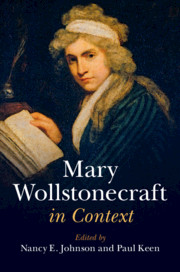Book contents
- Mary Wollstonecraft in Context
- Mary Wollstonecraft in Context
- Copyright page
- Contents
- Illustrations
- Notes on Contributors
- Preface
- Frontispiece
- Chronology
- Part I Life and Works
- Part II Critical Fortunes
- Part III Historical and Cultural Contexts
- The French Revolution Debate
- The Rights of Woman Debate
- Philosophical Frameworks
- Legal and Social Culture
- Chapter 23 The Constitution
- Chapter 24 Property Law
- Chapter 25 Domestic Law
- Chapter 26 Slavery and Abolition
- Chapter 27 The Bluestockings
- Chapter 28 Conduct Literature
- Chapter 29 Theories of Education
- Literature
- Suggested Further Reading
- Index
Chapter 28 - Conduct Literature
from Legal and Social Culture
Published online by Cambridge University Press: 16 January 2020
- Mary Wollstonecraft in Context
- Mary Wollstonecraft in Context
- Copyright page
- Contents
- Illustrations
- Notes on Contributors
- Preface
- Frontispiece
- Chronology
- Part I Life and Works
- Part II Critical Fortunes
- Part III Historical and Cultural Contexts
- The French Revolution Debate
- The Rights of Woman Debate
- Philosophical Frameworks
- Legal and Social Culture
- Chapter 23 The Constitution
- Chapter 24 Property Law
- Chapter 25 Domestic Law
- Chapter 26 Slavery and Abolition
- Chapter 27 The Bluestockings
- Chapter 28 Conduct Literature
- Chapter 29 Theories of Education
- Literature
- Suggested Further Reading
- Index
Summary
Mary Wollstonecraft was both a writer and a fierce critic of what we now loosely define as “conduct literature.” In one of the most powerful chapters in A Vindication of the Rights of Woman, her searing “Animadversions on Some of the Writers Who Have Rendered Women Objects of Pity, Bordering on Contempt” focus particularly on two of the most popular advice texts of the period, James Fordyce’s Sermons to Young Women (1766) and John Gregory’s A Father’s Legacy to his Daughters (1774). But her first publication, Thoughts on the Education of Daughters (1787), was in many respects an orthodox piece of advice writing. Indeed, some passages in Thoughts strongly echo Gregory’s views, and Wollstonecraft included several excerpts from his writings in her anthology The Female Reader (1789). These perhaps unexpected continuities are a valuable reminder of the wide spectrum of texts and writers offering guidance on girls’ and women’s education and behavior in the eighteenth and early nineteenth centuries, and of the danger in making ahistorical assumptions about their identity and effects. At the same time, the shifts in Wollstonecraft’s engagement with Gregory indicate her increasingly sophisticated alertness to the workings of textual politics and provide insight into the radicalizing effects of French Revolutionary ideas on her intellectual development.
- Type
- Chapter
- Information
- Mary Wollstonecraft in Context , pp. 238 - 245Publisher: Cambridge University PressPrint publication year: 2020



